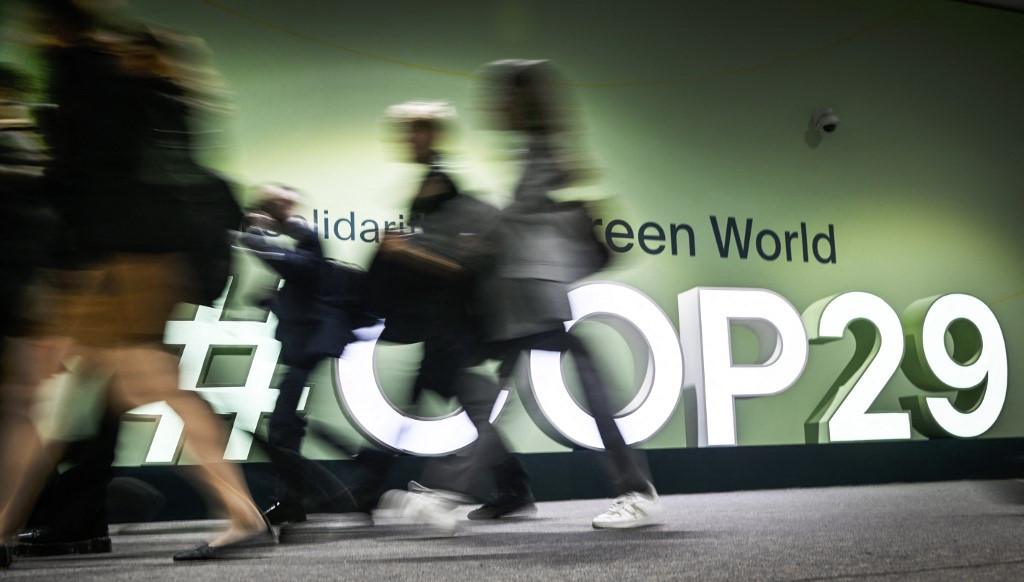Popular Reads
Top Results
Can't find what you're looking for?
View all search resultsPopular Reads
Top Results
Can't find what you're looking for?
View all search resultsCOP29: What is the latest science on climate change?
The last global scientific consensus on climate change was released in 2021 through the Intergovernmental Panel on Climate Change, however scientists say that evidence shows global warming and its impacts are unfolding faster than expected.
Change text size
Gift Premium Articles
to Anyone
 People walk past the logotype at the venue for the 2024 United Nations Climate Change Conference (COP29) in Baku on November 11, 2024. The COP29 climate talks open on November 11 in Azerbaijan, under the long shadow cast by the re-election of Donald Trump, who has pledged to row back on the United States' carbon-cutting commitments. (AFP/ Alexander NEMENOV)
People walk past the logotype at the venue for the 2024 United Nations Climate Change Conference (COP29) in Baku on November 11, 2024. The COP29 climate talks open on November 11 in Azerbaijan, under the long shadow cast by the re-election of Donald Trump, who has pledged to row back on the United States' carbon-cutting commitments. (AFP/ Alexander NEMENOV)
T
his year's U.N. climate summit - COP29 - is being held during yet another record-breaking year of higher global temperatures, adding pressure to negotiations aimed at curbing climate change.
The last global scientific consensus on climate change was released in 2021 through the Intergovernmental Panel on Climate Change, however scientists say that evidence shows global warming and its impacts are unfolding faster than expected.
Here is some of the latest climate research:
1.5C breached?
The world may already have hit 1.5 degree Celsius (2.7 F) of warming above the average pre-industrial temperature - a critical threshold beyond which it is at risk of irreversible and extreme climate change, scientists say.
A group of researchers made the suggestion in a study released on Monday based on an analysis of 2,000 years of atmospheric gases trapped in Antarctic ice cores that extends the understanding of pre-industrial temperature trends.
Scientists have typically measured today's temperatures against a baseline temperature average for 1850-1900. By that measure, the world is now at nearly 1.3 C (2.4 F) of warming.
But the new data suggests a longer pre-industrial baseline, based on temperature data spanning the year 13 to 1700, the study published in the journal Nature Geoscience said.
Either way, 2024 is certain to be the warmest year on record.
Supercharged hurricanes
Not only is ocean warming fueling stronger Atlantic storms, it is also causing them to intensify more rapidly, for example, jumping from a Category 1 to a Category 3 storm in just hours.
Growing evidence shows this is true of other ocean basins.
Hurricane Milton needed only one day in the Gulf of Mexico in October to go from tropical storm to the Gulf's second-most powerful hurricane on record, slamming Florida's west coast.
Warmer air can also hold more moisture, helping storms carry and eventually release more rain. As a result, hurricanes are delivering flooding even in mountain towns like Asheville, North Carolina, inundated in September by Hurricane Helene.
Wildfire deaths
Global warming is drying waterways and sapping moisture from forests, creating conditions for bigger and hotter wildfires from the U.S. West and Canada to southern Europe and Russia's Far East creating more damaging smoke.
Research published last month in Nature Climate Change calculated that about 13% of deaths associated with toxic wildfire smoke, roughly 12,000 deaths, during the 2010s could be attributed to the climate effect on wildfires.
Coral bleaching
With the world in the throes of a fourth mass coral bleaching event — the largest on record — scientists fear the world's reefs have passed a point of no return.
Scientists will be studying bleached reefs from Australia to Brazil for signs of recovery over the next few years if temperatures fall.
Amazon alarm
Brazil's Amazon is in the grips of its worst and most widespread drought since records began in 1950. River levels sank to all-time lows this year, while fires ravaged the rainforest.
This adds concern to scientific findings earlier this year that between 10% and 47% of the Amazon will face combined stresses of heat and drought from climate change, as well as other threats, by 2050.
This could push the Amazon past a tipping point, with the jungle no longer able to produce enough moisture to quench its own trees, at which point the ecosystem could transition to degraded forests or sandy savannas.
Globally, forests appear to be struggling.
A July study found that forests overall last year failed to absorb as much carbon dioxide from the atmosphere as in the past, due largely to the Amazon drought and wildfires in Canada.
That means a record amount of CO2 entered the atmosphere.
Volcanic surge
Scientists fear climate change could even boost volcanic eruptions.
In Iceland, volcanoes appear to be responding to rapid glacier retreat. As ice melts, less pressure is exerted on the Earth's crust and mantle.
Volcanologists worry this could destabilize magma reservoirs and appears to be leading to more magma being created, building up pressure underground.
Some 245 volcanoes across the world lie under or near ice and could be at risk.
Ocean slowdown
The warming of the Atlantic could hasten the collapse of a key current system, which scientists warn could already be sputtering.
The Atlantic Meridional Overturning Circulation (AMOC), which transports warm water from the tropics to the North Atlantic, has helped to keep European winters milder for centuries.
Research in 2018 showed that AMOC has weakened by about 15% since 1950, while research published in February in the journal Science Advances, suggested that it could be closer to a critical slowdown than previously thought.










